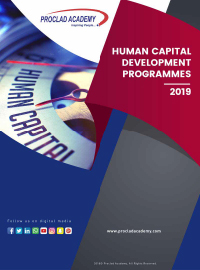Effective Workplace Communication
| Ref No. | Dates | Venue | Fee (US$) | |
|---|---|---|---|---|
| MG 025 | 31 May - 04 Jun 2020 | Dubai | 4500 | Register |
| MG 025 | 08 - 12 Nov 2020 | Dubai | 4500 | Register |
Effective Workplace Communication
Introduction
In today’s competitive business world and difficult economy, effective communication is more essential than ever before. It is the foundation on which companies and careers are built, and a crucial component of lasting success. Whether it is a face-to-face conversation or a professionally written e-mail exchange, a meaningful message entails establishing a connection that leaves a powerful impression.
PROCLAD Academy’s Effective Workplace Communication training course looks at the skills necessary to communicate, with impact, face-to-face include listening, conversing one-on-one, establishing rapport, resolving conflict and understanding and accommodating differences when communicating across gender lines. The course will help participants develop a truly engaging and responsive communication style, leading to positive results for them and their organisation.
The key features of PROCLAD Academy’s Effective Workplace Communication training course are:
- Increased self-awareness of different behavioral styles
- An understanding of how to adapt your style for successful co-operation
- An understanding of communication errors and how to prevent them
- The ability to develop positive relationships through effective techniques
Learning Objectives
By the end of PROCLAD Academy’s Effective Workplace Communication training course, participants will be able to:
- Gain an understanding of the principles underlying perception of human behaviour
- Compare one-way versus two-way communication and analyze the verbal and non-verbal language of the communication process
- Identify personal listening styles and different approaches to improve listening
- Understand, via role-play, different personality types and identify effective ways to deal with others
- Use non-verbal communication techniques to developing shared meaning
Target Audience
PROCLAD Academy’s Effective Workplace Communication training course is suitable for anyone who wishes to improve their communication skills and;
- Create ‘presence’
- Reduce time spent organizing, designing and preparing communications
- Overcome “mental blocks” about how to express your thoughts
- Handle Q&A sessions effectively, bolstering credibility and confidence
- Present authoritatively and persuasively with impact and flare
- Heighten professional image, self-confidence and career prospects
Training Methodology
PROCLAD Academy’s practical and results-oriented Effective Workplace Communication training course is based on adult learning concept. It incorporates short inspiring demonstrations, roles play and practice to enhance learning. There will be ample time for Q&A, discussions with ‘return to work’ action planning. The training will reinforce key concepts within an inspiring and engaging learning environment.
Course Outline
- The Communication Process: defining successful communication and its components
- The importance of interpersonal communication and its benefits in relationship building
- The different forms communication take and communication barriers
- Barriers to Communication – Our Filter. Behaviours vs. Intentions vs. Images and their influence on our perceptions
- The Three V’s of Communication: verbal, vocal, visual
- Communication success factors with co-workers, employees and managers
- The different communication styles and when to use each one
- Appreciating the styles of others and how to build better working relationships once you know their style
- Strategies for changing your communication profile
- Changing your response to stereotypical perceptions
- The relationship between self-control and interpersonal communication
- Delivering clear, concise messages and avoiding relative words, euphemisms, emotive language and stereotypical language
- The attitudes of communication/negotiation and their application
- Moving toward your goal in a conversation (and on the telephone)
- Acknowledging others using emphatic listening
- Encouraging others to speak more and express themselves
- Using questions to obtain shared meaning and build relationships
- Distinguish between the informing and directing skills
- Influencing the behaviors of those who do not directly report to you
- Maintaining your emotional control to develop effective communications with others
- Using assertive strategies when communicating with others and avoiding or controlling aggressive ones/conflict situations
- Responding to criticism you get from others
- Non-verbal communication
- Working with challenging and difficult colleagues, customers, employees etc. – how to work towards consensus and continuous improvement
- Using your communication skills in group settings: presenting etc.
- Handling complaints
- Action planning – developing an action plan for using the program skills back on the job


